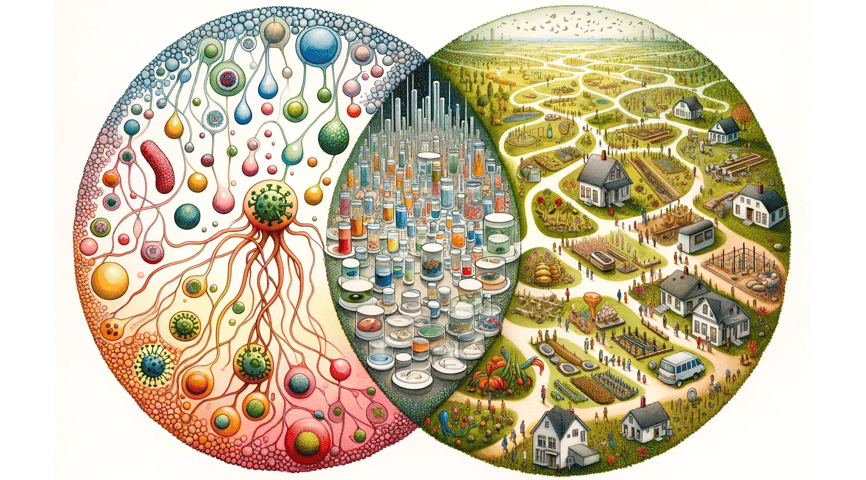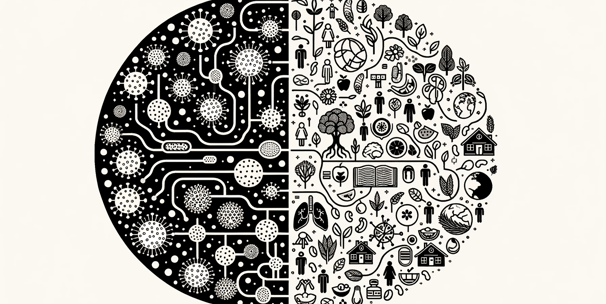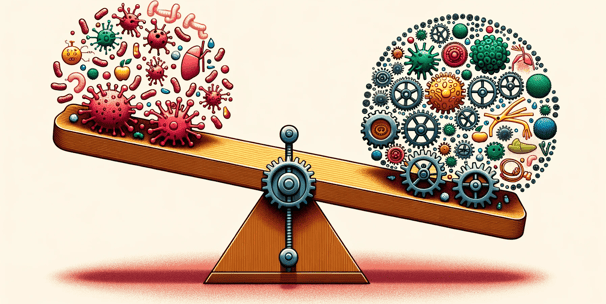Redefining the Concept of Sickness: From Germ Theory to Complex Systems
Modern medicine's foundational understanding of sickness, based on the Germ Theory, attributes diseases to specific microorganisms. While this framework significantly advanced our knowledge, emerging public health challenges require a more nuanced understanding. This article aims to revisit and redefine the concept of sickness, emphasizing the interplay of various determinants, with tuberculosis (TB) in India serving as a poignant illustration.
ALTERNATIVE MEDICINE
10/8/20233 min read


Abstract:
Modern medicine's foundational understanding of sickness, based on the Germ Theory, attributes diseases to specific microorganisms. While this framework significantly advanced our knowledge, emerging public health challenges require a more nuanced understanding. This article aims to revisit and redefine the concept of sickness, emphasizing the interplay of various determinants, with tuberculosis (TB) in India serving as a poignant illustration.
Introduction
The Germ Theory, a cornerstone of modern medicine, identifies microorganisms as the primary culprits behind many diseases. However, the multifaceted nature of sickness in today's context calls for a broader perspective that encompasses socio-economic, environmental, and individual factors.
The Complex Nature of Sickness
Infections, as emphasized by the Germ Theory, result from invasions by microorganisms. But not everyone exposed to these germs falls ill. Why? The answer lies in the complex interplay of factors that determine an individual's health.
Sickness, or a compromised state of health, can indeed create a favorable environment for microorganisms to cause illness. When a person's immune system is weakened or disrupted due to various factors such as stress, malnutrition, underlying health conditions, or environmental factors, they may be more susceptible to infections. So, sickness or a state of compromised health can predispose an individual to infections by creating an opportunity for microorganisms to take hold and multiply. This perspective aligns with the understanding that a person's immune system is a critical defense against infections, and a weakened immune system can contribute to the onset of sickness and infectious diseases. While the Germ Theory remains a fundamental concept in microbiology and infectious disease control, it's valuable to consider the broader context of a person's overall health and immune function in understanding susceptibility to illness. This nuanced perspective can help in addressing the factors that contribute to both sickness and infectious diseases, ultimately leading to more comprehensive approaches to healthcare and disease prevention.
Sickness, while often linked to pathogens, is profoundly influenced by an array of factors:
Socio-economic Conditions: Poverty and socio-economic disparities can weaken immune systems, making individuals more susceptible to diseases.
Nutrition: Malnutrition can impair immune function, raising vulnerability to infectious diseases.
Environment: Overcrowded living conditions, pollution, and limited access to clean water play roles in disease prevalence.
Mental and Emotional Health: Chronic stress, anxiety, and depression can compromise the body's ability to fight off illnesses.
Tuberculosis in India: A Case Study
TB in India offers a vivid example of the intricate relationship between socio-economic factors and disease prevalence:
Beyond Mycobacterium Tuberculosis: While TB is instigated by the bacterium Mycobacterium tuberculosis, socio-economic conditions, nutrition, living circumstances, and healthcare access greatly influence the spread and impact of the disease.
A Holistic Public Health Approach: Addressing TB requires more than just medical interventions. A comprehensive strategy involves improving socio-economic conditions, ensuring access to nutritious food, strengthening healthcare infrastructure, and fostering community engagement.
From Vertical to Horizontal: A Paradigm Shift in Healthcare
The challenges posed by diseases like TB in India highlight the need for a transformation in public health strategies:
Vertical Approach: Traditional, disease-specific interventions, such as drug treatments, can be effective short-term but may not address broader health determinants.
Horizontal Approach: This approach emphasizes systemic health enhancement, targeting underlying determinants like socio-economic conditions, nutrition, and environment. By recognizing health's multifaceted nature, this strategy offers sustainable solutions.
Conclusion
While the Germ Theory provided a foundational understanding of diseases, contemporary challenges demand a broader perspective. Embracing a complex systems approach can lead to more inclusive, effective, and sustainable health solutions, ultimately revolutionizing healthcare systems globally.
References:
Engel, G. L. (1977). The need for a new medical model: A challenge for biomedicine. Science, 196(4286), 129-136.
McEwen, B. S., & Stellar, E. (1993). Stress and the individual: Mechanisms leading to disease. Archives of internal medicine, 153(18), 2093-2101.
Farmer, P. (1999). Infections and inequalities: The modern plagues. University of California Press.
World Health Organization. (2020). Global Tuberculosis Report. World Health Organization.
Redefining the Concept of Sickness: From Germ Theory to Complex Systems






My post content


